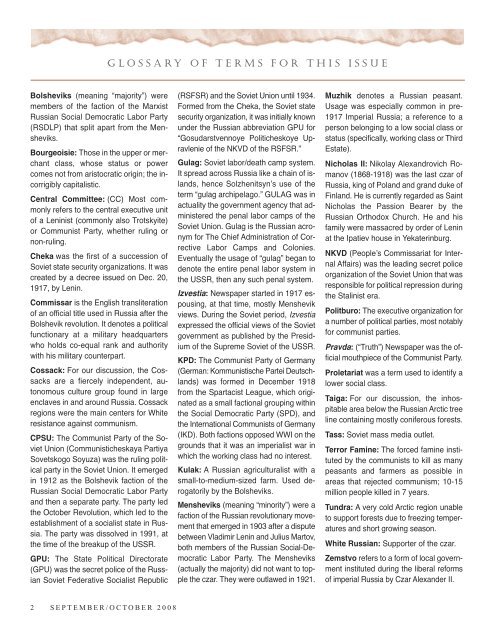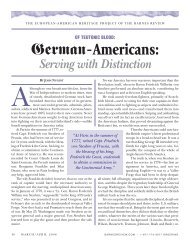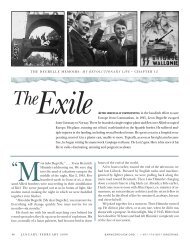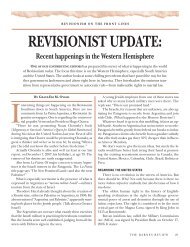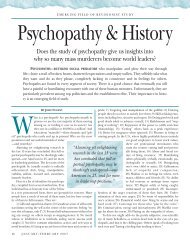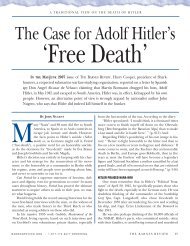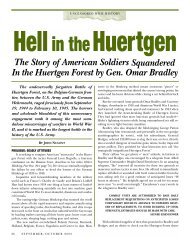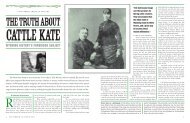Russia and the Jews
Russia and the Jews
Russia and the Jews
Create successful ePaper yourself
Turn your PDF publications into a flip-book with our unique Google optimized e-Paper software.
G L O S S A R Y O F T E R M S F O R T H I S I S S U E<br />
Bolsheviks (meaning “majority”) were<br />
members of <strong>the</strong> faction of <strong>the</strong> Marxist<br />
<strong>Russia</strong>n Social Democratic Labor Party<br />
(RSDLP) that split apart from <strong>the</strong> Mensheviks.<br />
Bourgeoisie: Those in <strong>the</strong> upper or merchant<br />
class, whose status or power<br />
comes not from aristocratic origin; <strong>the</strong> incorrigibly<br />
capitalistic.<br />
Central Committee: (CC) Most commonly<br />
refers to <strong>the</strong> central executive unit<br />
of a Leninist (commonly also Trotskyite)<br />
or Communist Party, whe<strong>the</strong>r ruling or<br />
non-ruling.<br />
Cheka was <strong>the</strong> first of a succession of<br />
Soviet state security organizations. It was<br />
created by a decree issued on Dec. 20,<br />
1917, by Lenin.<br />
Commissar is <strong>the</strong> English transliteration<br />
of an official title used in <strong>Russia</strong> after <strong>the</strong><br />
Bolshevik revolution. It denotes a political<br />
functionary at a military headquarters<br />
who holds co-equal rank <strong>and</strong> authority<br />
with his military counterpart.<br />
Cossack: For our discussion, <strong>the</strong> Cossacks<br />
are a fiercely independent, autonomous<br />
culture group found in large<br />
enclaves in <strong>and</strong> around <strong>Russia</strong>. Cossack<br />
regions were <strong>the</strong> main centers for White<br />
resistance against communism.<br />
CPSU: The Communist Party of <strong>the</strong> Soviet<br />
Union (Communisticheskaya Partiya<br />
Sovetskogo Soyuza) was <strong>the</strong> ruling political<br />
party in <strong>the</strong> Soviet Union. It emerged<br />
in 1912 as <strong>the</strong> Bolshevik faction of <strong>the</strong><br />
<strong>Russia</strong>n Social Democratic Labor Party<br />
<strong>and</strong> <strong>the</strong>n a separate party. The party led<br />
<strong>the</strong> October Revolution, which led to <strong>the</strong><br />
establishment of a socialist state in <strong>Russia</strong>.<br />
The party was dissolved in 1991, at<br />
<strong>the</strong> time of <strong>the</strong> breakup of <strong>the</strong> USSR.<br />
GPU: The State Political Directorate<br />
(GPU) was <strong>the</strong> secret police of <strong>the</strong> <strong>Russia</strong>n<br />
Soviet Federative Socialist Republic<br />
(RSFSR) <strong>and</strong> <strong>the</strong> Soviet Union until 1934.<br />
Formed from <strong>the</strong> Cheka, <strong>the</strong> Soviet state<br />
security organization, it was initially known<br />
under <strong>the</strong> <strong>Russia</strong>n abbreviation GPU for<br />
“Gosudarstvennoye Politicheskoye Upravlenie<br />
of <strong>the</strong> NKVD of <strong>the</strong> RSFSR.”<br />
Gulag: Soviet labor/death camp system.<br />
It spread across <strong>Russia</strong> like a chain of isl<strong>and</strong>s,<br />
hence Solzhenitsyn’s use of <strong>the</strong><br />
term “gulag archipelago.” GULAG was in<br />
actuality <strong>the</strong> government agency that administered<br />
<strong>the</strong> penal labor camps of <strong>the</strong><br />
Soviet Union. Gulag is <strong>the</strong> <strong>Russia</strong>n acronym<br />
for The Chief Administration of Corrective<br />
Labor Camps <strong>and</strong> Colonies.<br />
Eventually <strong>the</strong> usage of “gulag” began to<br />
denote <strong>the</strong> entire penal labor system in<br />
<strong>the</strong> USSR, <strong>the</strong>n any such penal system.<br />
Izvestia: Newspaper started in 1917 espousing,<br />
at that time, mostly Menshevik<br />
views. During <strong>the</strong> Soviet period, Izvestia<br />
expressed <strong>the</strong> official views of <strong>the</strong> Soviet<br />
government as published by <strong>the</strong> Presidium<br />
of <strong>the</strong> Supreme Soviet of <strong>the</strong> USSR.<br />
KPD: The Communist Party of Germany<br />
(German: Kommunistische Partei Deutschl<strong>and</strong>s)<br />
was formed in December 1918<br />
from <strong>the</strong> Spartacist League, which originated<br />
as a small factional grouping within<br />
<strong>the</strong> Social Democratic Party (SPD), <strong>and</strong><br />
<strong>the</strong> International Communists of Germany<br />
(IKD). Both factions opposed WWI on <strong>the</strong><br />
grounds that it was an imperialist war in<br />
which <strong>the</strong> working class had no interest.<br />
Kulak: A <strong>Russia</strong>n agriculturalist with a<br />
small-to-medium-sized farm. Used derogatorily<br />
by <strong>the</strong> Bolsheviks.<br />
Mensheviks (meaning “minority”) were a<br />
faction of <strong>the</strong> <strong>Russia</strong>n revolutionary movement<br />
that emerged in 1903 after a dispute<br />
between Vladimir Lenin <strong>and</strong> Julius Martov,<br />
both members of <strong>the</strong> <strong>Russia</strong>n Social-Democratic<br />
Labor Party. The Mensheviks<br />
(actually <strong>the</strong> majority) did not want to topple<br />
<strong>the</strong> czar. They were outlawed in 1921.<br />
Muzhik denotes a <strong>Russia</strong>n peasant.<br />
Usage was especially common in pre-<br />
1917 Imperial <strong>Russia</strong>; a reference to a<br />
person belonging to a low social class or<br />
status (specifically, working class or Third<br />
Estate).<br />
Nicholas II: Nikolay Alex<strong>and</strong>rovich Romanov<br />
(1868-1918) was <strong>the</strong> last czar of<br />
<strong>Russia</strong>, king of Pol<strong>and</strong> <strong>and</strong> gr<strong>and</strong> duke of<br />
Finl<strong>and</strong>. He is currently regarded as Saint<br />
Nicholas <strong>the</strong> Passion Bearer by <strong>the</strong><br />
<strong>Russia</strong>n Orthodox Church. He <strong>and</strong> his<br />
family were massacred by order of Lenin<br />
at <strong>the</strong> Ipatiev house in Yekaterinburg.<br />
NKVD (People’s Commissariat for Internal<br />
Affairs) was <strong>the</strong> leading secret police<br />
organization of <strong>the</strong> Soviet Union that was<br />
responsible for political repression during<br />
<strong>the</strong> Stalinist era.<br />
Politburo: The executive organization for<br />
a number of political parties, most notably<br />
for communist parties.<br />
Pravda: (“Truth”) Newspaper was <strong>the</strong> official<br />
mouthpiece of <strong>the</strong> Communist Party.<br />
Proletariat was a term used to identify a<br />
lower social class.<br />
Taiga: For our discussion, <strong>the</strong> inhospitable<br />
area below <strong>the</strong> <strong>Russia</strong>n Arctic tree<br />
line containing mostly coniferous forests.<br />
Tass: Soviet mass media outlet.<br />
Terror Famine: The forced famine instituted<br />
by <strong>the</strong> communists to kill as many<br />
peasants <strong>and</strong> farmers as possible in<br />
areas that rejected communism; 10-15<br />
million people killed in 7 years.<br />
Tundra: A very cold Arctic region unable<br />
to support forests due to freezing temperatures<br />
<strong>and</strong> short growing season.<br />
White <strong>Russia</strong>n: Supporter of <strong>the</strong> czar.<br />
Zemstvo refers to a form of local government<br />
instituted during <strong>the</strong> liberal reforms<br />
of imperial <strong>Russia</strong> by Czar Alex<strong>and</strong>er II.<br />
2 S E P T E M B E R / O C T O B E R 2 0 0 8


